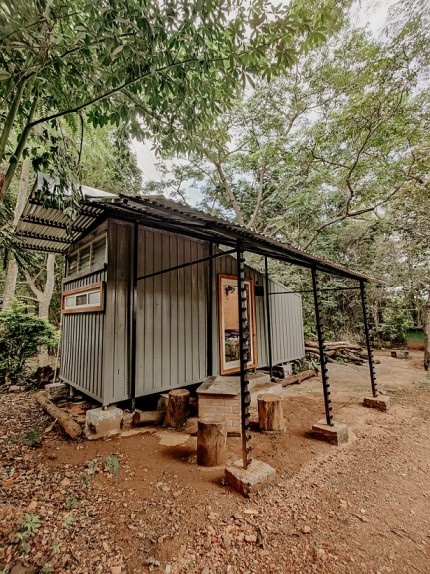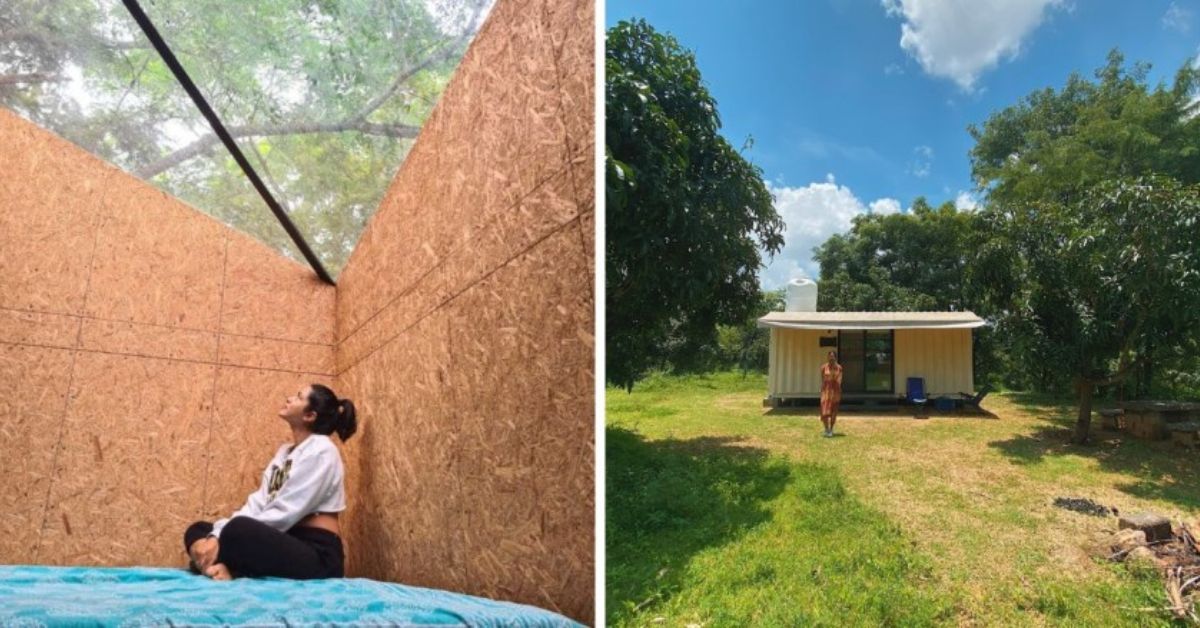On the outskirts of Bengaluru lie a series of ‘tiny homes’, situated amid lush organic farms and moderately dense forest covers. These are not your average hotel or homestay — they come as movable structures that aim to embrace minimalism and “a return to nature”.
Designed by architect and entrepreneur Arsh Bansal, these have been set up under the aegis of Tenpy, a travel startup that builds tiny homes in Karnataka.
The idea, the 29-year-old says, was inspired by his childhood in the hills, which built his inclination for tranquility and the environment.
“Even though I was born in Lucknow, I grew up in Mussoorie, a serene land away from the hustle of the city. When I moved to Bengaluru for education, that’s what I missed the most — the lull of trees and sight of hills,” he tells The Better India
After his bachelor’s in architecture, Arsh took up a postgraduate degree in environmental design and later worked in several internships in sustainable architecture practices. He says that following these, he felt an urge to put together something of his own. This is when he revisited the topic of tiny homes, which he had learnt about during his MSc years ago.

In 2020, Tenpy opened its first home in Doddenahalli. “Rusty, my first project, was designed completely from scratch and built under my guidance. The idea of the travel startup is to come up with tiny homes in nature for digital detox and as a getaway from city life,” he shares.
The canopied tents
“The name Tenpy,” Arsh explains, “is a combination of two words — tent to highlight temporariness, and canopy for permanence.”
The startup currently has six homes, and is constructing two more in Maharashtra, which are set to open within two months. Arsh personally selects each spot for the homes.
“I usually look for organic farms or secluded areas not too far away from the city. In some cases, if there are homestays already working in the locality, I take them over and rebuild the structure. This will help the owners with additional income. Also, the employees in each of these houses will be the local population, majorly families, where one takes care of cooking and others in housekeeping or assistance,” he explains.
Arsh says he doesn’t go behind popular tourist destinations, instead intending to provide slow, sustainable, agri-tourism options.
“I could have easily found land in Chikkamagaluru, Coorg, or any other crowded tourist spot in Karnataka. But my aim was to pick places located in a radius of 60-70 km from the city, where there are plenty of farmlands and a calm environment,” he says.
Arsh firmly believes that nature has the power to bring out one’s creative instincts. His homes encourage digital detoxification by providing spaces without WiFi or TVs. Every now and then, he invites artists, singers, and photographers to the homes to encourage guests to explore their own artistic sides.
“This was also a method of marketing Tenpy. Social media is our only advertising space. We also invite influencers and vloggers who understand the concept of tiny living and sustainability,” he adds.
Initially, Arsh chose shipping containers to set up his minimal homestays. But he eventually found it difficult to experiment with designing there and heating, too, came up as an issue as the containers are made of metal.
He then shifted to a hybrid approach, where both local materials as well as prefabricated structures are used to complete the structure. “Almost 70 per cent of all the tiny homes are moveable. For the remaining 30 per cent, brick and cement are used,” says the architect, adding that the homes are majorly made with chip boards, cement boards and bamboo.
“We let all the guests know that this is not a normal hotel or resort with plenty of amenities. In fact, we ask them to carry the trash (non-biodegradable) with them while leaving to make them feel responsible, and also because we don’t have any measures to compost it. Tenpy is basically a comfortable stay in the wild where you get a whole do-it-yourself (DIY) kind of experience. Our idea is to reduce the carbon footprint and promote slow tourism,” he says.
“All these things account for us improving the overall experience of sustainability but we are very far away from what we want to achieve.”
Tenpy also provides activities like trekking, hiking, swimming, rafting, and organic farming. “But the actual idea is to do nothing,” Arsh smiles. “The big glass windows and natural ventilation will bring you the feel of nature to the home itself. All you have to do is relax and enjoy it.”
The price of stay in Tenpy per night is Rs 4,200 for two, and an extra Rs 1,000 per head for all meals of a day. Since its inception, the homes have seen an average of 60 per cent occupancy through the year.
Arsh is all set to launch four more homes around Bengaluru and expand to areas like Sakleshpur and Dehradun, where opportunities to grow are plenty.
Arsh is of the opinion that sustainability is manifold.
“One is the construction side, where we use recycled, eco-friendly materials and pre-structured buildings by not making new ones. The other one is related to the mental wellness aspect. Having a lifestyle focused on living a decluttered life that leans towards a more sustainable idea is important. It is as simple as saying no to a plastic bag and reusing a bottle, or rejecting a call while on a staycation, or not replying to a work mail on a weekend,” he says.
For more information, you can visit Tenpy’s website.
Edited by Divya Sethu; Photo credits: Arsh Bansal
If you found our stories insightful, informative, or even just enjoyable, we invite you to consider making a voluntary payment to support the work we do at The Better India. Your contribution helps us continue producing quality content that educates, inspires, and drives positive change.
Choose one of the payment options below for your contribution-
By paying for the stories you value, you directly contribute to sustaining our efforts focused on making a difference in the world. Together, let's ensure that impactful stories continue to be told and shared, enriching lives and communities alike.
Thank you for your support. Here are some frequently asked questions you might find helpful to know why you are contributing?

